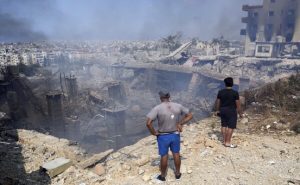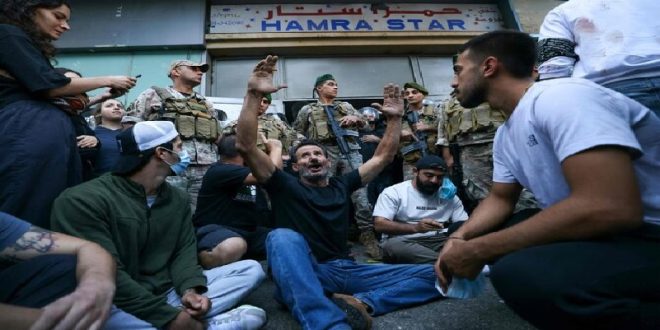31-10-2024
BEIRUT: The sound of war is loud at night in Beirut’s eastern Achrafieh neighborhood.
Residents can hear Israeli air strikes hitting the Lebanese capital’s southern suburbs, known as Dahieh. Some can even see the explosions lighting up the sky from their balconies.
 However, on the streets it is quiet. Volunteers in uniform are patrolling the predominantly Christian neighborhood holding walkie-talkies to co-ordinate their operation.
However, on the streets it is quiet. Volunteers in uniform are patrolling the predominantly Christian neighborhood holding walkie-talkies to co-ordinate their operation.
The neighborhood watch was formed a few years ago following the financial crisis that hit Lebanon to reassure residents worried about crime but with recent developments, the mission has changed.
“We have concerns with displaced people who are coming in huge numbers to Beirut, and they have a lot of needs, and it is very complicated,” says Nadim Gemayel, who formed the organization behind the neighborhood watch.
Communities across Lebanon rallied to help house and feed the hundreds of thousands of families who were displaced when Israel escalated its air campaign against Hezbollah last month before launching a ground invasion of the south.
However, an influx of people from the predominantly Shia Muslim areas where the Iran-backed group has a strong presence Dahieh, south Lebanon, and the Bekaa Valley in the east into places which are majority Sunni Muslim and Christian also risk exacerbating sectarian divisions in a country where memories of the 1975-1990 civil war are still vivid.
Recent Israeli attacks on those areas has only served to heighten tensions between residents and the displaced.
A strike on 14 October in the northern town of Aitou, which killed 23 displaced people, shook the Christian community.
Even though the arrival of wealthy Shia families from the south and Dahieh have caused rental prices to skyrocket and boosted the incomes of landlords, many are now concerned that they could be members of Hezbollah and potential Israeli targets.
 Some building management firms have sent out forms to residents asking them for identity details, the number of family members who are staying in flats, and vehicles they are using.
Some building management firms have sent out forms to residents asking them for identity details, the number of family members who are staying in flats, and vehicles they are using.
In some areas, leaflets have been distributed asking for members of Hezbollah to leave, while individuals known to be affiliated with the group have been told to go.
“There is a feeling of fear. Some citizens are suspicious about who is coming to their region. A lot of people are very afraid that some Hezbollah members live in a building where they are followed by Israel and probably targeted,” Gemayel says.
“This is why we are trying to follow up what’s happening and trying to control this with the army and security forces to secure the refugees and citizens at the same time.”
Although residents may feel reassured by the neighborhood watch, some worry that such initiative carries echoes of the civil war, when sectarian militias controlled different areas of Beirut.
The civil war, which lasted 15 years and left almost 150,000 people dead, pitted militias linked to Lebanon’s sects against each other.
It began as a conflict between Christian and Palestinian militias, which were allied with Muslim militias. Later, there were conflicts among Christian and Muslim militias. Foreign powers were also drawn in, with Syrian troops moving in and Israel invading twice. (Int’l News Desk)
 Pressmediaofindia
Pressmediaofindia




